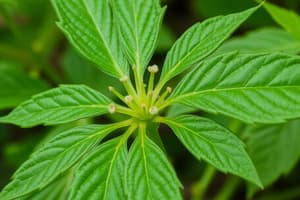Podcast
Questions and Answers
What does photosynthesis use in order to make sugar?
What does photosynthesis use in order to make sugar?
Light, carbon dioxide, and water.
What types of organisms are photosynthetic?
What types of organisms are photosynthetic?
Some protists, some bacteria, and all plants.
How do humans benefit from photosynthesis?
How do humans benefit from photosynthesis?
The process produces oxygen for humans to breathe.
What do plants and animals use glucose for?
What do plants and animals use glucose for?
What is cellular respiration?
What is cellular respiration?
How is cellular respiration related to photosynthesis?
How is cellular respiration related to photosynthesis?
What is chlorophyll?
What is chlorophyll?
Where is chlorophyll found in plants?
Where is chlorophyll found in plants?
What are the two major reactions that occur in chloroplasts?
What are the two major reactions that occur in chloroplasts?
Where does the light-dependent reaction take place?
Where does the light-dependent reaction take place?
What happens at the molecular level during the light-independent reaction?
What happens at the molecular level during the light-independent reaction?
Where does the light-independent reaction occur in the chloroplast?
Where does the light-independent reaction occur in the chloroplast?
Where does the ATP and NADPH used to make glucose in the light-independent reaction come from?
Where does the ATP and NADPH used to make glucose in the light-independent reaction come from?
Give some examples of consumers that benefit from the energy supplied by plants.
Give some examples of consumers that benefit from the energy supplied by plants.
What is photosynthesis?
What is photosynthesis?
What is glucose?
What is glucose?
Flashcards are hidden until you start studying
Study Notes
Photosynthesis Overview
- Photosynthesis converts light energy, carbon dioxide, and water into sugar (glucose).
- Involves various organisms: certain protists, some bacteria, and all plants.
Importance of Photosynthesis
- Produces oxygen essential for human respiratory needs.
- Plants and animals utilize glucose for ATP energy production, necessary for cellular functions.
Cellular Respiration Connection
- Cellular respiration (CR) is how glucose is transformed into ATP energy by organisms.
- CR utilizes glucose and oxygen from photosynthesis, producing ATP, carbon dioxide, and water.
- Photosynthesis relies on products from CR, emphasizing the interdependence of both processes.
Chlorophyll and Its Role
- Chlorophyll is a pigment that absorbs red and blue light, reflecting green, which gives plants their color.
- Found within thylakoids in chloroplasts of plant cells.
Reactions in Chloroplasts
- Two primary reactions occur:
- Light-dependent reactions: convert light energy into chemical energy.
- Light-independent reactions (Calvin Cycle or dark reactions): synthesize glucose from carbon dioxide and hydrogen.
Light-Dependent Reactions
- Occur in thylakoids (stacked structures called granum).
- Water is split into hydrogen and oxygen using light energy.
- Reactants: water; Products: oxygen and protons.
Light-Independent Reactions
- Take place in the stroma surrounding thylakoids.
- Use carbon dioxide and hydrogen to produce glucose through molecular rearrangement.
- Called "dark" reactions as they don’t directly require light but rely on energy carriers from light-dependent reactions.
Role of ATP and NADPH
- ATP supplies necessary energy for the light-independent reaction.
- NADPH provides reducing power, both generated during light-dependent reactions.
Consumers Benefiting from Plants
- Includes any organism that consumes plants or other organisms that directly eat plants.
- Almost all living organisms are indirectly reliant on plant energy through various food chains.
Summary of Key Terms
- Photosynthesis: The process of converting sunlight into chemical energy.
- Glucose: A simple sugar vital as a key energy source for living organisms.
Studying That Suits You
Use AI to generate personalized quizzes and flashcards to suit your learning preferences.




